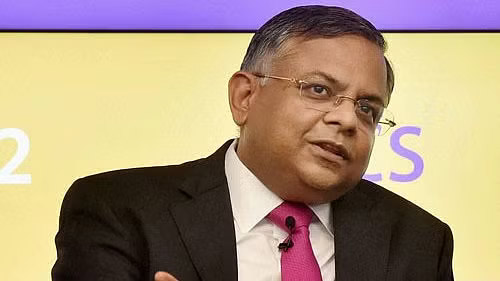NEW DELHI, Dec 26: Tata Sons Chairman N Chandrasekaran stated on Thursday that as global supply chains increasingly favor India, the manufacturing sector has the potential to significantly reshape the country’s economy.
In his New Year address to the employees of the salt-to-software conglomerate, Chandrasekaran described this period as “a new manufacturing golden age for India,” expressing his optimism for 2025 after a challenging 2024, which saw the loss of Tata Group Chairman Emeritus Ratan Tata.
“While innovations in AI for healthcare and transport can benefit humanity overall, manufacturing stands as a pivotal force for our nation’s economic transformation,” he remarked.
He added, “The ongoing shift in global supply chains towards India signifies that the largest global corporations are now finding equilibrium between resilience and efficiency. What initially appeared to be a temporary reaction to the pandemic has evolved into a lasting change.”
In light of persistent geopolitical tensions, Chandrasekaran noted, “The scale has tipped towards resilience, and India, with its vast talent pool and expanding manufacturing capability, is positioned to reap the rewards.”
Reaffirming Tata Group’s commitment to generating 500,000 manufacturing jobs over the next five years, he stated that part of this will stem from investments in diverse facilities throughout India, including projects focused on batteries, semiconductors, electric vehicles, solar technology, and other essential hardware crucial for the future economy.
He mentioned the commencement of groundbreaking ceremonies and construction for over seven new manufacturing units, including India’s pioneering semiconductor fab in Dholera, Gujarat, along with a new semiconductor OSAT facility in Assam.
Additionally, he highlighted an electronics assembly plant in Narasapura, Karnataka, an automotive plant in Panapakkam, Tamil Nadu, and new MRO facilities in Bengaluru, Karnataka.
“We are also establishing new battery cell manufacturing plants in Sanand, Gujarat, and Somerset, UK. The C295 final assembly line (FAL) has been inaugurated in Vadodara, Gujarat, and solar module production has commenced in Tirunelveli, Tamil Nadu,” Chandrasekaran shared.
The creation of 500,000 new jobs will be “in addition to numerous service roles anticipated across retail, technology services, aviation, hospitality, and other industries.”
“Such initiatives are exciting for our group and for India, but they also provide hope to the million young individuals entering the workforce each month. Fortunately, manufacturing has strong multiplier effects; indirect job opportunities stemming from sectors like semiconductor production are substantial,” he pointed out.
“Looking ahead to 2025 fills me with hope and optimism. India’s economy is robust, and the prevailing trends are supportive of our growth,” he emphasized.
He asserted, “In this era of technological advancement and renewed Indian manufacturing, our large reservoir of young talent will not only shape our nation’s future but will actively construct it with their skills and intellect.”
Reflecting on 2024, he described it as an “unpredictable year,” marked globally by geopolitical unrest and slight improvements in macroeconomic perspectives.
“Ongoing military conflicts in Ukraine, Gaza, and Sudan have intensified humanitarian crises across Europe, the Middle East, and Africa. Moreover, we have observed citizen-led movements in Bangladesh and South Korea,” he noted.
As the year comes to an end, Chandrasekaran reflected, “Political changes and disruptions continue to influence domestic and international policies, particularly regarding immigration, technology, and global trade, with tariffs once again capturing the attention of leaders.”
He added, “However, amidst these significant global developments, 2024 will hold a personal significance for me and everyone connected to our Group as it marks the year we lost Mr. Ratan Tata — a man whose character, integrity, and visionary leadership profoundly impacted our business for generations.”
In a poignant message, he expressed, “Though starting a new year without Mr. Tata is a challenge, it comforts us to know that the business he dedicated his life to continues to flourish. The major strategic initiatives he advocated are beginning to pay off, especially in high-tech sectors and manufacturing, where our presence is expanding.”
Chandrasekaran observed a “reversal in roles of science and technology” in his remarks.
“Let’s consider AI and technology. A notable shift is taking place. Traditionally, progress in science has spurred advancements in technology. For example, breakthroughs in quantum physics led to the digital revolution,” said the Tata Sons Chairman.
Today, however, we are witnessing the reverse: technological advancements are driving scientific exploration.
“The Nobel Prize for Chemistry this year was awarded to creators of an AI model capable of predicting protein structures — illustrating how computational developments will transform drug discovery,” he detailed, noting that previously, establishing the 3D structure of a single protein could take a year or more, while AI tools can now accurately predict these shapes in mere minutes.
“AI also holds transformative potential for healthcare, enhancing our understanding and treatment of diseases, as well as the accuracy of diagnoses. Machine learning is increasingly applied in environmental studies as well, and large language models may greatly improve access to clinical care,” he asserted.
He concluded by stating, “We will undoubtedly see a substantial increase in the application of AI in sectors like healthcare and mobility.” (PTI)


Leave a Reply